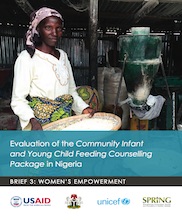Women’s empowerment and gender equity are globally recognized as essential for sustainable development. Not only is women’s empowerment crucial for women’s human rights, but a growing evidence base suggests that empowering women improves nutrition outcomes for both mothers and their children.
One review estimates that improvements in women’s status and education account for more than half of the global reductions in child underweight from 1970–1995, and another review estimates that increasing female secondary education contributed to almost one-third of reductions in child stunting in sub-Saharan Africa from 1970–2010. Clearly, women’s empowerment is an important factor in improving nutrition outcomes for women and children; as such, gender equity is an important component of the enabling environment.
In 2014, the Nigerian Federal Ministry of Health (FMOH), UNICEF, and the USAID-funded Strengthening Partnerships, Results, and Innovations in Nutrition Globally (SPRING) project launched a study of the UNICEF Community Infant and Young Child Feeding (C-IYCF) Counselling Package in Kaduna State to assess the effectiveness of the national C-IYCF Counselling Package when adapted for the local context and implemented at scale in one local government area (LGA), Kajuru LGA, Nigeria. This document is a report on that study.
This brief presents key findings from the baseline study related to five aspects of women’s empowerment: educational attainment, employment, participation in decision making, control of resources, and mobility. In addition, the research team recommends actions to strengthen women’s empowerment and success in implementing and scaling up the C-IYCF Counselling Package in Nigeria.
JSI/Strengthening Partnerships, Results, and Innovations in Nutrition Globally (SPRING) project. 2017.


